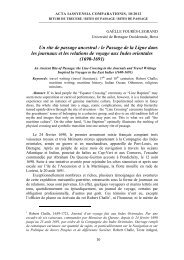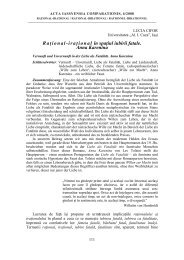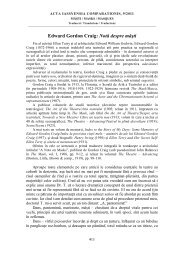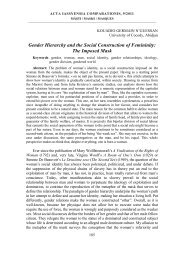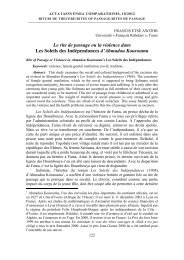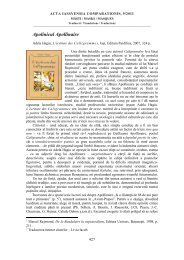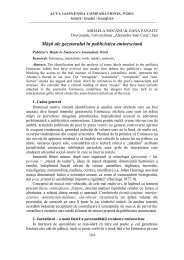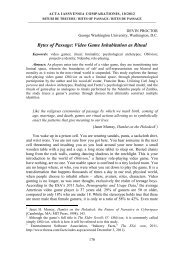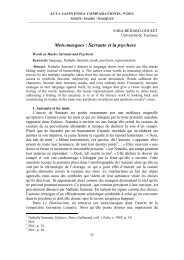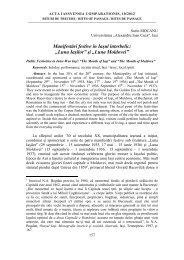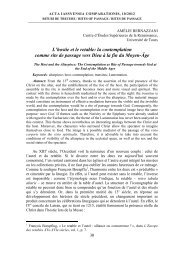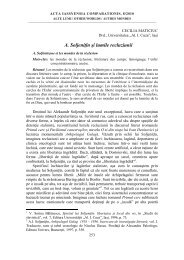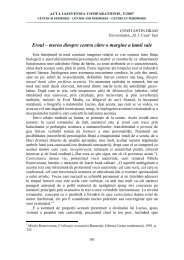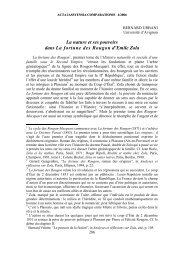Foreign Home and Familiar Abroad in Salman Rushdie's The ...
Foreign Home and Familiar Abroad in Salman Rushdie's The ...
Foreign Home and Familiar Abroad in Salman Rushdie's The ...
You also want an ePaper? Increase the reach of your titles
YUMPU automatically turns print PDFs into web optimized ePapers that Google loves.
ACTA IASSYENSIA COMPARATIONIS, 8/2010<br />
ALTE LUMI / OTHER WORLDS / AUTRES MONDES<br />
________________________________________________________________________________<br />
1.6. Salad<strong>in</strong> back to Salahudd<strong>in</strong> – the sharp kick of reality<br />
After the explosion of Bostan, the plane, on his return from India <strong>and</strong> his<br />
l<strong>and</strong><strong>in</strong>g on the British l<strong>and</strong>, Salad<strong>in</strong> turns <strong>in</strong>to a goat-resembl<strong>in</strong>g devilish creature,<br />
his m<strong>in</strong>utely composed English appearance crack<strong>in</strong>g to let go of an “Animal (…)<br />
You’re all the same. Can’t expect animals to observe civilized st<strong>and</strong>ards. (…) you<br />
little fuck” (158) Engl<strong>and</strong>, the “cool Vilayet” (37), becomes a “universe of fear”<br />
(158) whose only entities are three immigration officers <strong>and</strong> five policemen. In the<br />
police van where he is boxed up under the suspicion of be<strong>in</strong>g an illegal immigrant<br />
or at least a serious social danger, Salad<strong>in</strong> experiences his first contact with real<br />
Engl<strong>and</strong> – “he felt a sharp kick l<strong>and</strong> on his ribs, pa<strong>in</strong>ful <strong>and</strong> realistic enough” (158)<br />
– <strong>and</strong> realizes that he is perceived <strong>in</strong> the same way as the “riff-raff from villages <strong>in</strong><br />
Sylhet or the bicycle-repair shops of Gujranwala” (159) <strong>and</strong> not at all accord<strong>in</strong>g to<br />
his m<strong>in</strong>utely constructed English identity. (Look<strong>in</strong>g like Shaitan would have<br />
contradicted any English looks one way or another!)<br />
<strong>The</strong> humiliation experienced by the still gullible Salad<strong>in</strong> is later sentimentally<br />
theorized <strong>in</strong>to a self-oriented lamentation: if he obeyed <strong>and</strong> assumed all that<br />
Engl<strong>and</strong> st<strong>and</strong>s for, “then how cruel these fates were to <strong>in</strong>stigate his rejection by<br />
the very world he had so determ<strong>in</strong>edly courted; how desolat<strong>in</strong>g, to be cast from the<br />
gates of the city one believed oneself to have taken long ago! – what mean smallm<strong>in</strong>dedness<br />
was this, to cast him back <strong>in</strong>to the bosom of his people, from whom<br />
he’d felt so distant for so long!” (254)<br />
After the disaster produced at the Hot Wax nightclub, where, because of him,<br />
everyth<strong>in</strong>g was set on fire, Salad<strong>in</strong>, com<strong>in</strong>g back to his human appearance,<br />
declares: “I’ll come back to life.” (400)<br />
<strong>The</strong> real London forces him <strong>in</strong>to expla<strong>in</strong><strong>in</strong>g the abstract notions from his<br />
previous sterile discourse: “Easier said than done; it was life, after all, that had<br />
rewarded his love of a dream-child with childlessness; his love of a woman, with her<br />
estrangement from him <strong>and</strong> her <strong>in</strong>sem<strong>in</strong>ation by his old college friend; his love of a<br />
city, by hurl<strong>in</strong>g him down towards it from Himalayan heights; <strong>and</strong> his love of a<br />
civilization, by hav<strong>in</strong>g him bedeviled, humiliated, broken upon its wheel.” (401)<br />
Return<strong>in</strong>g to India s<strong>in</strong>ce hear<strong>in</strong>g about his father’s imm<strong>in</strong>ent death, - but not because<br />
of this - Salad<strong>in</strong> approaches his much despised past differently, revaloriz<strong>in</strong>g what he,<br />
as a child, bl<strong>in</strong>dly rejected as be<strong>in</strong>g necessarily bad. From this new perspective, “His<br />
old English life, its bizzarreries, its evils, now seemed very remote, even irrelevant,<br />
like his truncated stage-name.” (534) What has happened is not a reversal of roles –<br />
Engl<strong>and</strong>: bad, India: good – but Salad<strong>in</strong>’s underst<strong>and</strong><strong>in</strong>g <strong>and</strong> valu<strong>in</strong>g of the two<br />
realities <strong>and</strong>, most importantly, of his relat<strong>in</strong>g to them (Salad<strong>in</strong>’s evolution from<br />
fanaticism to humanism is the topic of a different article).<br />
2. India – between the Country of Oz <strong>and</strong> Assam<br />
2.1. Salad<strong>in</strong>’s India – from dust to muck<br />
<strong>The</strong> image of India which Salahudd<strong>in</strong> repudiates by embrac<strong>in</strong>g the image of<br />
Engl<strong>and</strong> <strong>in</strong>stead breathes the same artificiality as the latter. Abjur<strong>in</strong>g India<br />
orig<strong>in</strong>ates <strong>in</strong> a prejudice, a mental cliché, not <strong>in</strong> the least the consequence of it<br />
285



